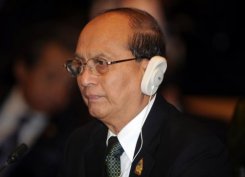Myanmar has promised to "seriously consider" allowing Southeast Asian observers for by-elections marking the opposition's return to mainstream politics, according to the Asean regional bloc.

Myanmar has promised to "seriously consider" allowing election observers for April 1 by-elections in which Aung San Suu Kyi is standing, according to the Association of Southeast Asian Nations. It said Myanmar President Thein Sein (pictured in 2011) made the pledge to visiting ASEAN Secretary-General Surin Pitsuwan during talks in the capital Naypyidaw.
The April 1 polls, which will see Nobel laureate Aung San Suu Kyi stand for a seat in parliament for the first time, are viewed as a key test of the military-backed government's commitment to budding reforms.
The Association of Southeast Asian Nations (Asean) said in a statement that Myanmar President Thein Sein made the pledge to its visiting Secretary-General Surin Pitsuwan during talks in the capital Naypyidaw.
"We will seriously consider having observers from Asean ... during the April elections," Thein Sein was quoted as saying.
A 2010 election which swept the army's political allies to power was marred by widespread complaints of cheating and intimidation.
Foreign election observers and international media were not allowed into the country for that vote, which was denounced by Suu Kyi's opposition party and Western powers as lacking legitimacy.
Suu Kyi's National League for Democracy (NLD) party held a news conference on Monday to warn that the fairness of the April vote was also under threat because it was being denied the use of suitable venues for campaign rallies.
But just hours later the NLD said the authorities had eased the restrictions in a turnaround it described as "very significant."
The opposition cannot threaten the ruling party's majority even if it takes all 48 available seats in the by-elections, but a Suu Kyi win would lend legitimacy to the fledgling parliament.
The NLD won a landslide victory in an election in 1990, but the then-ruling junta never allowed the party to take power.
Suu Kyi was under house arrest at the time. She was released from her latest stint in detention a few days after the 2010 vote.
Suu Kyi's decision to stand for a seat in parliament is the latest sign of dramatic change taking place in the country formerly known as Burma after the end last year of nearly half a century of outright military rule.
The regime has surprised observers with reforms including welcoming the NLD back into the political mainstream, signing ceasefire deals with ethnic minority rebels and releasing hundreds of political prisoners.
The upcoming polls are being held to fill places vacated by those who have since become government and deputy ministers.
The new military-backed government, which is dominated by former generals, assured visiting top EU officials last week that the vote would be democratic.
Western nations are now considering further easing sanctions, adding to hopes of an end to decades of isolation, but controversy surrounding the 2010 vote means the upcoming by-elections will be heavily scrutinised.

No comments:
Post a Comment